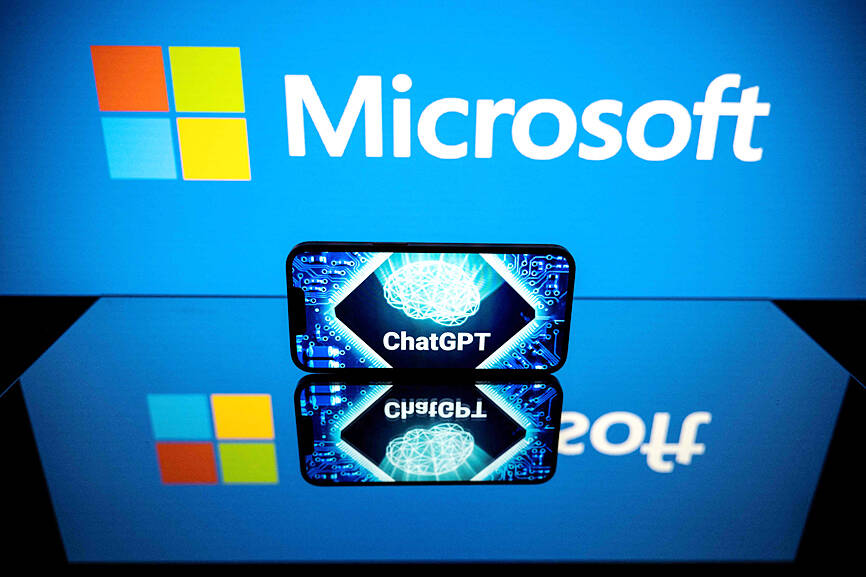Artificial intelligence (AI) would be dangerous in the hands of unscrupulous people, Microsoft Corp chief economist Michael Schwarz said yesterday.
“I am confident AI will be used by bad actors, and yes, it will cause real damage,” Schwarz said during a World Economic Forum panel in Geneva, Swizerland. “It can do a lot damage in the hands of spammers with elections and so on.”
AI “clearly” must be regulated, but lawmakers should be cautious and wait until the technology causes “real harm,” he said.

Photo: AFP
AI tools have come under increased scrutiny as their use exploded in recent months following the debut of ChatGPT. Policymakers are trying to pressure companies to implement safeguards around the emerging technology.
“Once we see real harm, we have to ask ourselves the simple question: ‘Can we regulate that in a way where the good things that will be prevented by this regulation are less important?’” Schwarz said. “The principles should be: The benefits from the regulation to our society should be greater than the cost to our society.”
US Vice President Kamala Harris is today scheduled to meet with the Microsoft, Alphabet Inc and OpenAI Inc CEOs as part of US President Joe Biden administration’s effort to pressure companies to implement safeguards around the emerging technology.
Harris and administration officials plan to tell the corporate leaders that they have a responsibility to mitigate potential harm from AI tools, a White House official said.
Last week, G7 digital ministers said that member nations should adopt “risk-based” regulation of AI, while EU lawmakers reached a preliminary agreement on the Artificial Intelligence Act, which would regulate the emerging technology.
Microsoft is working on guardrails to mitigate the potential danger from AI tools, Schwarz said.
The company is already using OpenAI’s ChatGPT in its Bing search product, and Google released its rival Bard chatbot in March.
Schwarz said that policymakers should be careful not to directly regulate AI training sets.
“That would be pretty disastrous,” he said. “If [the US] Congress were to make those decisions about training sets, good luck to us.”
Despite the risks, AI can help humans, Schwarz said.
“We, as mankind, ought to be better off because we can produce more stuff with less work,” he said.
AI would revolutionize the way most businesses operate, he said, adding that it would take time.
“I like to say AI changes nothing in the short run and it changes everything in the long run,” Schwarz said. “That is true for every single technology that came before.”

In Italy’s storied gold-making hubs, jewelers are reworking their designs to trim gold content as they race to blunt the effect of record prices and appeal to shoppers watching their budgets. Gold prices hit a record high on Thursday, surging near US$5,600 an ounce, more than double a year ago as geopolitical concerns and jitters over trade pushed investors toward the safe-haven asset. The rally is putting undue pressure on small artisans as they face mounting demands from customers, including international brands, to produce cheaper items, from signature pieces to wedding rings, according to interviews with four independent jewelers in Italy’s main

Japanese Prime Minister Sanae Takaichi has talked up the benefits of a weaker yen in a campaign speech, adopting a tone at odds with her finance ministry, which has refused to rule out any options to counter excessive foreign exchange volatility. Takaichi later softened her stance, saying she did not have a preference for the yen’s direction. “People say the weak yen is bad right now, but for export industries, it’s a major opportunity,” Takaichi said on Saturday at a rally for Liberal Democratic Party candidate Daishiro Yamagiwa in Kanagawa Prefecture ahead of a snap election on Sunday. “Whether it’s selling food or

CONCERNS: Tech companies investing in AI businesses that purchase their products have raised questions among investors that they are artificially propping up demand Nvidia Corp chief executive officer Jensen Huang (黃仁勳) on Saturday said that the company would be participating in OpenAI’s latest funding round, describing it as potentially “the largest investment we’ve ever made.” “We will invest a great deal of money,” Huang told reporters while visiting Taipei. “I believe in OpenAI. The work that they do is incredible. They’re one of the most consequential companies of our time.” Huang did not say exactly how much Nvidia might contribute, but described the investment as “huge.” “Let Sam announce how much he’s going to raise — it’s for him to decide,” Huang said, referring to OpenAI

The global server market is expected to grow 12.8 percent annually this year, with artificial intelligence (AI) servers projected to account for 16.5 percent, driven by continued investment in AI infrastructure by major cloud service providers (CSPs), market researcher TrendForce Corp (集邦科技) said yesterday. Global AI server shipments this year are expected to increase 28 percent year-on-year to more than 2.7 million units, driven by sustained demand from CSPs and government sovereign cloud projects, TrendForce analyst Frank Kung (龔明德) told the Taipei Times. Demand for GPU-based AI servers, including Nvidia Corp’s GB and Vera Rubin rack systems, is expected to remain high,